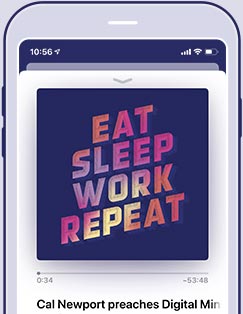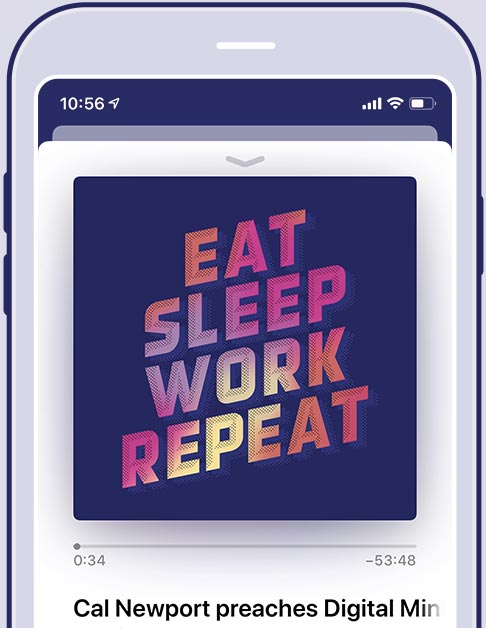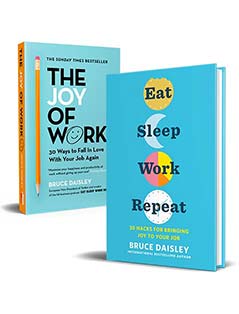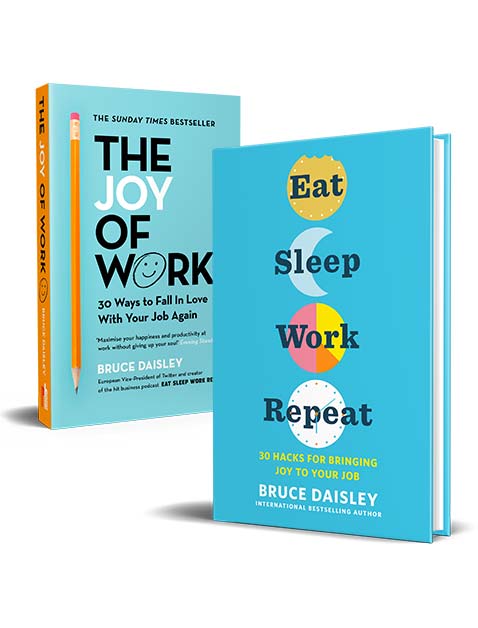The Netflix Culture Document
The “Netflix culture document” is one of the best known works on company culture. For a company that is beloved of millions for it’s shows and service, their published document is a spiky explanation of the realities of working there.
Patty McCord is one of the brains behind it. She explains why the brutal honesty of the document is such a contrast to what we normally hear from firms.
Full transcript
- “The worst thing companies can do is write down an aspirational document with what they want to be and then not do it”
- Treat people like adults. Give maximum autonomy to teams
- When people have an amazing day at work it’s generally when they’ve accomplished something
PATTY MCCORD: When I first started working with Reid at Netflix we decided that we would write things down about our culture. It was just kind of a weird quirk that he had because we had worked together in another company and the culture was kind of meh. So what we thought we’d do is we just write it down and we would share this slide deck it was an onboarding kind of document. And so we would write it and we talk about it and then we talked to our executive team about it and we talked to the extended leadership team about it. And then we would talk about it probably twice a year at some offsite. So it was very collaborative. Each chapter is built on the chapter before. Reid came to me one morning, so we started writing it in 1997 and in 2008 we were driving to work together one day because we carpooled together and he said ‘hey I met this woman last night with this really cool company and she can publish PowerPoint slides on the web’.
I said ‘well that’s pretty cool. What do you think people will publish?’ And he said ‘I put out the deck’. And I said ‘you can’t do that’. He said ‘why not?’ I said ‘first of all it’s the ugliest document known to humankind’. I mean I don’t think at the time the fonts were even the same chapter after chapter. And I said ‘Reid you’re going to scare away all of our candidate’s.
And he said ‘only the ones we don’t want’.
It’s sort of like the Gangnam style of Linked In isn’t it? I think it’s been shared 15 million times.
PATTY MCCORD: A couple of things about it, one of them was it changed the way we interviewed 100% in 24 hours because all of a sudden everybody was reading it before they came in to talk to us. And we started having really deep conversations right off the bat. Instead of ‘tell me what you’re good at, tell me what you could do differently’, someone would come in and go ‘what no time off? how does that work?
And so it was just a great way for us to get started. And I think one of your questions is also about the values the part that we wrote in the beginning about the values. So what I wanted to do was not write down aspirational values. I wanted to write down behaviors I want to just say if you’re honest I better see you do it. And if you’re dishonest then the culture should punish that. And so that particular part of the culture deck when I was there we wrote that seven times.
So that is specifically the part… you say that often values are these things that are put on the reception wall of companies but they’re not truly the things that are valued in the company. And you list the seven things that are valued in the company.
PATTY MCCORD: Yeah I wanted to write down things that people said and did. I often describe to people ‘you should be able to make a movie of it’.
I should be able to walk in and say well that that person is being really transparent and candid – they’re saying what they believe.
Because the overall feeling of the deck, it’s basically just treating people like grownups. And so you realise in hindsight that a lot of the way companies treat us is like this adult/child relationship.
PATTY MCCORD: And I don’t even think we would treat our children that badly. You know honestly it’s not really even a healthy adult child relationship. And I think the other thing that’s very appealing about the deck to people is that it’s just logical. There’s nothing really crazy, innovative in there it’s just that it’s true. And it’s the stuff that people don’t say. They say ‘we want to do anonymous engagement survey because we believe engaged employees are empowered and contribute more to the bottom line’. But they don’t measure it and it’s anonymous. So how do you know someone is engaged if they’re anonymous. And instead of that it’s just sort of saying here’s the truth: we hire you to do a job and sometimes you work really hard on that job. And then it’s over and then you move on and we move on and that’s healthy and that’s OK. And oh by the way when you’re here it’s not that confusing.
And tell me this. I think one of the things that people find refreshing/alarming about it is that it’s very decidedly when you read it: this culture isn’t for everyone. You read this and you’re either your heart quickens because you’re scared by, or your heart quickens because you’re exhilarated by it. But some of the things in there you’re really candid about. You say you might do an okay job and we’re going to pay you off to leave.
PATTY MCCORD: That particular slide is a little bit provocative to push the edge of it. Honestly more often what happens in companies is one of two things happens. Either you become less interested in the work as it evolves. I just had breakfast with the Netflix alumni the other day and he was a guy who is a brilliant technical guy who loves the problem nobody else has ever solved. He wants new, wide open spaces. He’s really brilliant thinking out of the box. All of his jobs have been four years in a row. And so we were talking he was asking for career advice and he’s like ‘well you know I have a family now and I have a mortgage and I have to be more settled down. I have to be careful about which company I enjoy’. I’m like ‘those are all great things’.
His whole life pattern is the same where he really is crazy in love with technology when it’s greenfield. It’s like nobody else ever thought that solution. And once he figures it out he gets bored. He’s great a raising a team and you know putting together a team. And so you know what my advice to him was just sort of recognize that’s a really good and healthy pattern of yours and just don’t worry about finding the company you’re going to be at for the rest of your life.
Yeah I think that’s one of the things that really comes out when you read through the articulation the culture. I think you even use the words ‘we’re a team not a family’ and it’s that sense, a realistic expectation that you probably won’t get buried at your current job.
PATTY MCCORD: Right. And I think that’s just the way of the future. For one thing we live longer we’re healthier we work longer. By and large. And we’re just going to see that particularly in technology because it moves so fast. So I have to tell you I was doing an interview with another person the other day who said ‘Well you know the stuff you say is really transformational. It’s really great. But what do you say to companies who have done things the way they always have and are much more traditional and much more rule bound.
And I said ‘well you know people can choose to do whatever they want to do. I just don’t like the lies that we tell people like that they’ll have lifetime employment’ and I said ‘you know that hasn’t been true for decades’. And he said well ‘you know it’s pretty recent’. I said ‘well how do you define recent?’
He goes ‘well it probably stopped being true in the 80s’. I said ‘It’s 2016! What say every 30 years or so we shake it up.
You said it transformed the approach of candidates coming to the company for interviews. Did it affect the attitude of the people who were working there. There’s one thing that articulates really clearly it says if you are a long term high performing worker having a bad time, we’re going to give you a pass for the short term but long term we’re not carrying you. And I wondered how people who were longtime employees would read that.
PATTY MCCORD: You know it’s so much of all of this is a matter of circumstance in any company. So sometimes when businesses grow they grow because they scale. So you’re serving 100,000 customers and now you’re going to serve 10 million. And that ability to scale and the understanding of working at a much much larger scale usually takes somebody with significantly more experience at bigger scale. So sometimes people can’t make that curve of fast enough. It’s not that they can’t do it over time it’s just that the timeframe gets shorter. Sometimes it’s that people realise that they love to work at a company with 150 people and they don’t like it when it’s 5000. It’s not fun anymore. It’s a very different company 10,000 person company, global companies are different. What usually happens from my 30 years of experience in H.R. is that the circumstances either change for the person or the circumstances change for the business. Good or bad on both. I’ll give you a story from the deck, from interviewing on the deck, interviewing a guy from Apple. This is you know probably 10 years ago. He’s a great guy I really really like him. And he says ‘I really like everything about the company, what you’re doing right now but no time off, the unlimited time thing. I don’t know if it’s going to work for me’.
I said ‘how come?’ and he said well ‘I’m kind of a workaholic and I got married last year and we’re about to have our first child’. I’m like ‘that’s great’.
He said ‘I don’t think I’ll be a very good father if I never come home’. I said ‘well, there’s probably truth in that’. He said ‘so you know you going to do about that?’ I said ‘about the fact that you got married and are having a baby? I mean I don’t think I have anything to do with that’. And he said ‘yeah but without the time off policy I’m afraid I won’t ever go home’. I said ‘it sounds like you’re more comfortable with more structured than we have. You should stay at Apple, it’s a great company. If that’s what’s important to you at this time in your life’. And this is a guy who probably worked all the time until he got married and was about about to have a baby so his life circumstances changed.
So I guess the critical thing isn’t it. Because the document and the culture is just far more honest about what a company expects and what a group of individuals get back than than we used to.
We’re use this notion that if a company says anything it’ll just be listing more benefits and we don’t we don’t hear the tradeoff in return. It’s probably the first time you read that. A critic might say it’s quite neo-liberal, it’s like hyper capitalism. Is that fair?
PATTY MCCORD: Yeah I think so. And I think it’s partly because the founder of the company Reed Hastings and so many of the early people were engineers. And the reason why I’ve come to find that employees become cynical about work is that what companies say they are and say that they’re going to act like and what they do are two different things. I did a talk with a bunch of H.R. people. 500 of them in a room and I said how many people in this room ever laid anybody off? 500 hands go up. I said how many of you are ever laid off a family member? Zero. How many of you went to work last week and at some point said ‘we’re a family’. And half of the people are squirming in their seats. We’re not a family. You know we could have another entire interview about corporate speak and H.R. speak and how those nonsensical words have crept into our business vocabulary that don’t mean anything. I mean what my particular favourite pet peeve is empowerment. You know I’m going a magic wand and empower you. And I tell people you know why we have to empower people, it’s because we took all their power away.
You walk in the door with power. You either can or can’t use it. The other thing about the Netflix culture that was difficult for people was that the culture is based on results, business results. Happy customers. The thing about a subscriber model is they have to keep getting happier all the time because that’s how the business works. There aren’t any companies that aren’t Internet companies anymore but our relationship to our customers is much more visceral than it used to be. And so it’s not just you know the boss tells you what’s happening with the revenue and the customer base you can find out. That connection between what you’re doing and is the customer happy is much more real and I think that makes things different. Then when we start talking about empowerment, you know it’s like does that make any sense anymore?
Tell me this, you’re now a consultant and people come and seek your advice. What you found at Netflix was the truth for Netflix. I think you articulate ‘the only way we’re going to succeed in the one of the most competitive markets in the world is if we’re the best we can be’. Other companies how would they come and find their truth presumably their truth and Netflix values are going to be, by definition, different.
PATTY MCCORD: Yes they are. And so I do a couple of things with them. One of them is: all companies all groups of people already have a culture. They may not have written it down but they have ways of behaving and interacting with each other that already exist. And the worst thing companies can do is write down an aspirational document with what they want to be and then not do it. An example I’m in a very small startup with the CEO of the company. I said that you had a perfect company you could create a dream work environment what would it be like. He said ‘I’m an engineer and I love efficiency. I would want it to be like clockwork, that we get amazing stuff done with really high quality at the time that our customers need it’. I said ‘that’s great. So I notice that we have four pool table here in this room’. ‘Yeah, pool is a big deal for us’. ‘So let’s say you and I were playing pool and I was about to beat you and I’ve never really beaten you before. It’s kind of gathered a crowd and it’s five minutes before two and our staff meetings started at two, and it’s going to take me half an hour to beat you. What happens?’ He said: ‘well I mean you know everybody’s watching. We going to finish this game’. I said ‘do you want to be efficient you got to start on time. So I’m like ‘it’s not what you say, it’s what you do.
And so when I went to a company not too long ago where when I started digging around about who they were they had very very clear code of ethics and conduct about their relationships with their customers. And I when I found this document – it was actually on their website – I’m like ‘here it is, what if you lived this? “We will always be honest and transparent with our customers, we’ll make it easy for them to interact with our service. Is this how you treat each other? You have a code of ethics right here right here written already. And so the second piece of what I advise people to do is I say, look, you’ve got to do what’s right for your business. And you’ve got to do what’s right for the leadership of the company because if they can’t walk the talk, if they can’t do the things they say you should do and don’t do them. And secondarily don’t assume that everybody else has it right. So when I talk to people they have you know all this traditional infrastructure, I’m like, look if that works for you I’m really OK with it. I just don’t want you to take it for granted that that’s the best thing.
I think the interesting thing that really comes out your work is on the podcast we’ve been talking to people about happiness and work culture and almost saying that work can be inclusive for everyone. And the stuff that comes out of your work really is this notion that there is – it’s almost like dating – you know there’s almost a perfect match for you and there’s other jobs that aren’t right for you. One of the things that comes out the discussions we’ve had is that happiness generally correlates with having a friend at work. So happiness at work, correlates with having a friend at work whereas I’m getting in the Netflix model it was more about someone who thrilled in completing the task rather than in the sociability.
PATTY MCCORD: You know it’s really fair. You know how my son works for us very classic, San Francisco startup where he had three meals a day and brought in his dog. He comes home for the holidays and he always makes a new cocktail. I said ‘how do you get to be such a good bartender?’ He said ‘well because in my company whenever they think we need team building we go to a bar tending school. I know six ways to a Manhattan’. And since he left that company and gone to a different company with very few perks. And he’s so much happier because he’s surrounded by people who are teaching him something. And he’s you know I said to him the other day ‘You love this new job don’t you?’ And I said ‘I forgot you’ve never actually been management before’. He said ‘Yeah I used to spend two of the five days of my week trying to figure out what to do on the other three’. So I say, I mean I believe this in my bones to be true, when you come home from work at night and you tell your pet you or your significant other or whoever’s at home ‘oh my God it was an amazing day at work today’. It’s almost always followed by: ‘we did’. It’s that sense of accomplishment that gives people their sense of worth. And I think that when you work around amazing people and you accomplish incredible stuff I think that’s what makes you happy at work. I don’t think you can buy it with craft beer.
What you brilliantly described was the fact that normally you start a small dynamic creative company and then as the company gets bigger as they try to make standards consistent across no longer people but 5000 people the way that most organisations do that is by introducing more control. And so consequently the company changes in fact to use the phrase in the deck they say: ‘time to grow up’. Probably a lot of people who’ve worked in companies where there’s been that mantra ‘time to grow up’. How then did you set about keeping that culture that we focused on ‘we’re going to accomplish things?’
PATTY MCCORD: Lots and lots and lots of communication. You have to assume that every single person in the company is capable of reading a P&L and understanding the business. And then the business itself, what you’re trying to do, what your important things are to accomplish, what makes customer happiness, what the revenue stream is – all those things that most companies reserve for the top, the elite, only the managers can know the important stuff. If you drive that down all levels of an organisation everybody can understand that stuff, it not at all that complicated. So what you want to do is you want to have incredible clarity about what’s important which also includes incredible clarity about what’s not important. Strategy isn’t what you do, it’s what you choose not to do. People need to carry what’s important in their heads and what’s not important. Secondarily they need to carry a time frame in their head. This is very hard for startups. ‘Someday,’ they’ll come in, ‘it will be amazing’ and like ‘well will you be 70 or 27. I don’t know. Help me with this “someday”‘. Then the more context – that’s also in the deck – the more people can operate using their own brains in their own timeframes and knowing what they need to accomplish then they can make responsible choices about what to do. And that collaborative working is how businesses move fast, they stay nimble and they stand informed. The top down hierarchical management structure – the problem with it is that in today’s world, it that it’s just too slow. It’s not logical anymore.
So much information is available to people that the idea of management hierarchy where the senior guys know something the junior guys don’t know, it’s not necessarily truly anymore. Here’s a great example: I always think it’s crazy when companies get to a certain stage and they decide that they need to put a framework around cost. So they assign somebody in finance, so you have to go to finance to get an expense approved over $5000 and all that person knows is what $5000 is. They don’t know if $5125 is the right way to negotiate that deal. They just know that they can’t, they say no after $5000. There’s no intelligence in and it does nothing but slow the thinking people down who are making the decision. Whereas in my experience if you focus on the results and you focus on the time frame and you focus on quality and somebody makes a bunch of wrong decisions then they’re probably in the wrong job. Or they don’t have very good judgment. That’s the thing we don’t talk about in busines, the people that are very successful are people that make the right call – they have good judgement, maturity.
One of the things you say is expenses policy. The expense policy that you operated was: do whatever is in the best interest of Netflix. And give some articulation of that but it’s back to treating people like adults. It’s pretty simplistic.
PATTY MCCORD: And what I did at Netflix that was really significantly different was I often I would say I was the COO of the culture. Let’s use the example I just gave you. So instead of having a group of people in a finance organisation whose job it was to pretty much say no we turned that group of people into a group of people whose job it was to report back to the organisation what the expenses were. Here’s what you said you were going to spend here, here what you’re actually spending, here’s what the trend line is, what’s changed in the business? So now it’s that actually the average cost of whatever that piece of software is is seven thousand dollars or pounds. Then we may want to change our projections for how much we’re going to spend on that next year. Now that’s intelligent, effective collaboration. Not having somebody have the power to say no. When you give people the power to say yes you’d be surprised how responsible they get all of a sudden. Nobody to point to.
Did you find people came along and said pretty quickly this wasn’t for them. Or how quickly were people able to work out whether Netflix culture was for them or not.
PATTY MCCORD: Well we try. That’s part of how we use the culture deck in the interview process and so we tried to get increasingly better as sussing it out in the interview process. I mean honestly it did turn out about 50 percent. They were like ‘these people are crazy, I don’t want to work there’. And then there were other people that would just self-select out. You know they would say ‘it’s too unstructured for me. I need it I need more structure to be effective’.
It’s a few years since you left Netflix now what are the trends you can see about how working life? Sheryl Sandberg said this is the most important document to come out of Silicon Valley so there is no shortage of admirers for the work that you did pinning down what culture meant but I’ve not seen many companies follow in the Netflix path…
PATTY MCCORD: I kind of put them into classification. Lots lots and lots of companies in the early stage startup world follow all of this stuff because they’re an early stage startups and they’re kind of chaotic. Medium sized companies they bristle because as soon as they’re going to be a public company or they get a significant amount of cash and inputs from an investor then the investors all came from pretty traditional companies typically and they think ‘you better grow up and start having some rules now.
‘It’s time for a handbook. It’s time for policies and procedures. It’s time to start doing things the way everybody else does’. They get afraid. When I work with those companies I say ‘you can choose all of those rules and regulations but choose them’. And make sure that when you’re choosing them because we’ve got to protect ourselves because our employees might sue us, remember that most of these are the same people that we thought were fabulous five minutes ago. I get invited a lot come and speak about innovation and when I talk to a very large companies about innovation I’m like the most innovative things they could do is stop doing stuff that doesn’t matter. Not doing anything differently it’s just stopping the stuff that you’ve always done that just waste time.
‘You know one of your questions was ‘what a generous severance’ [Netflix mention offering generous severance packages to under-performers throughout the deck]. Here’s the logic I used. You and I are working together and you’re working on a technology that we’re phasing out. We both know that we’re facing the technology out and we both know what the time frame is. It happens all the time.
Then I could put you on a performance improvement plan which is what most companies would do. And every week I’m meeting with you. And in writing I’m going to prove that you’re incompetent. You’re not incompetent. Technology’s changing. And we’re going to do that for 90 days. And by about the 45th day you realise ‘what a scam this is’. You’re mad. People sue companies because they’re mad. Not only are you mad but everybody else in the team feels like this is unfair. Because it is. And so what I would do instead was, I would sit down and say ‘hey Bruce, you’ve seen it coming, I’ve seen it coming’. So instead of spending the next 90 days in misery why don’t I pay you three months and let’s talk about what you’re going to do next.
So it’s just a straight forward chat to save you the dancing around.
PATTY MCCORD: And you’re doing all that stuff to protect yourself from the employee that’s going to sue you. But the reason they are going to see you is that you treat them unfairly and they’re mad. So don’t do that. And you know there’s employees they work there, they see it. No one wants to fail. So that’s how I made my guidelines around generous severance. I was like ‘well I went through the normal process what would that take? Let’s see if you’re an executive it might take a year or a couple of months’ or I just use what makes sense to me we just had that the straightforward conversations and give people a cushion and they go. People get sad about it because they want to be part of it going forward, but they get it. There’s there’s what we say we do and they want we really actually do. And what makes it crazy about it is that when we do the right things under the table and we say the wrong things outloud. We use words like did you get fired, did you get sacked? Like they’re any weapons involved, nobody is strangled.
I do a lot of talks with women’s groups and I say if you want to know what your worth, go interview. Engagement doesn’t mean they put a ring on it. When you go interview you’re not cheating on your husband, you’re finding out what you’re worth in the market and you should do that all the time.
And since you’ve left and you’ve been consulting I think it’s fair to say you’re writing a book now is that right? What do you think you’ll cover in that. What will you talk about in the book.
PATTY MCCORD: Pretty much the stuff that you and I have talked about this morning. Which is provocative saying ‘well let’s just stop and think about that, is that in fact true?’ I don’t want to be completely prescriptive but I want to be able to say really would you apply no thinking whatsoever, no metrics, no deliverables to any other part of your business? Why would do it with people. So what I learned by being in Netflix all those years I learned from the people I was surrounded with. And when you invent something that doesn’t exist you don’t look around and go let’s just do it a smidge better than everybody else already does. Never do that. The innovators mindset is ‘what are we trying to accomplish here?’ So for example in my book I’m going to talk about if you believed that feedback resulted in better or more consistent performance (which most of us do). If I say ‘no don’t do it that way, do it this way’. Then we’re going to do it “the right way” over time. So let’s say we both believe that. And you said ‘I want to create a system where people get really good feedback so that they can be a better performer’. Would you ever come up with the annual performance review? I’m going to tell you once a year in reflection what you did or didn’t do right after it’s too late to correct you.
What would you replace it.
PATTY MCCORD: Oh regular feedback. Something more often. I’m experimenting with a bunch of my companies, at least quarterly. You know most people have meetings their management regularly. I’m just like ‘talk to one of them on a regular basis and do performance feedback both to and from. Because the thing feedback, particularly difficult feedback, the reason why people suck at it is that they don’t practice. You’re only to have that conversation once a year and I’m going to say ‘by the way remember six months ago you sucked. Now here it is in writing and I’m going to put it in your employee file’.
And I’ve learned a lot since I left because I do a lot of talks with sports coaches. I did this talk with this guy who is like winningest National Hockey League coach in history, Scotty Bowman. He said ‘Well you know we have an 80 game season and every 10 games I sit down with every player and I pull all their stats. They do a self evaluation, I do an evaluation, I ask the players and other coaches what they think and we work on a plan for the next 10 games’. Moderator of the discussion says ‘you’re famous for hating the annual performance review, what would you do instead?’ I looked at him and I said ‘what he said’. You know it is brilliant. I mean I’ve learned all kinds. And you know when you talk to those guys, the people who coach professional sports teams.
The one thing that really comes out of the Netflix document, is that this is a very high performance creative industry. However the honesty of approach I think could be very suited to another sort of whole business. So it could be ‘our business is relentlessly focussed on customer loyalty, customer service’ and you could see it being applied to a supermarket chain. In the sense that we’re just going to communicate… It’s not the same values in as in the Netflix document… but our values are about honest communication. And so the things we value are these. For me the takeaway isn’t necessarily this (as I’ve described it there) this neoliberal Netflix culture but actually the approach of extreme honesty can work in any business.
PATTY MCCORD: Extreme honesty coupled with the baseline assumption that people in the workforce are adults and expect them to behave that way. Because everyone in the workforce is old enough to be in the workforce.
I talked to a pretty successful millennial based company in San Francisco the other day and one of the people in the HR team said to me ‘you know if we don’t take really good care of them and give them everything they want and make them happy, then they’re going to walk out the door walk down the street make more money and have more perks at the next company’. And I said ‘what leads you to believe that’s true?’ She said ‘well everyone knows’. I’m like ‘you know it’s second time you’ve said that and it’s the hundredth time I’ve heard it whenever I come to San Francisco’. How do you know? ‘Well everyone knows’. You get to exit interview people, when was the last time somebody left and turned right and got more money and a better bartender and that’s what they left? Is that true? And by the way if somebody is leaving you because they have better beer you say goodbye.
[/et_pb_text][/et_pb_column][/et_pb_row][/et_pb_section][et_pb_section fb_built=”1″ admin_label=”Quote Section” _builder_version=”3.0.76″ custom_margin=”40px||50px|” custom_padding=”0|0px|29.2882px|0px|false|false” locked=”off”][et_pb_row admin_label=”Quote” _builder_version=”3.0.76″][et_pb_column type=”4_4″ _builder_version=”3.0.47″ parallax=”off” parallax_method=”on”][et_pb_text admin_label=”Quote” _builder_version=”3.0.82″ text_text_color=”#747d88″ text_font_size=”24px” text_line_height=”1.8em” text_orientation=”center” max_width=”700px” module_alignment=”center” animation_style=”flip” animation_direction=”top” animation_intensity_flip=”20%”]Lorem Ipsum is simply dummy text of the printing and typesetting industry. Lorem Ipsum has been the industry’s standard dummy text ever.
[/et_pb_text][/et_pb_column][/et_pb_row][/et_pb_section]










